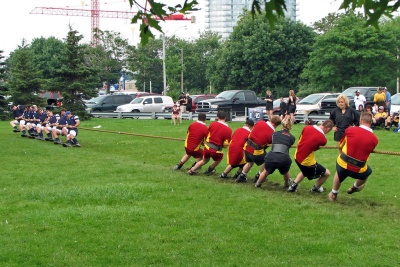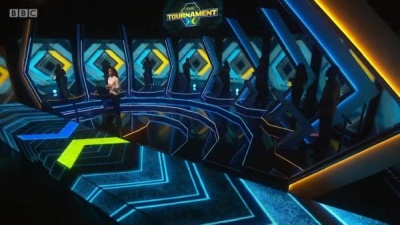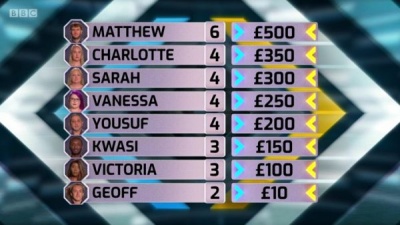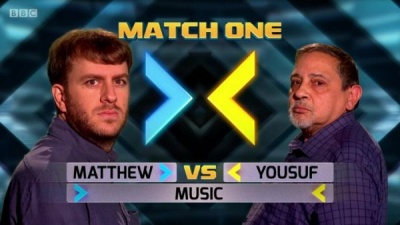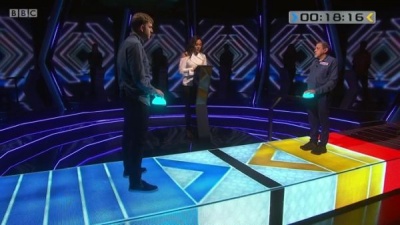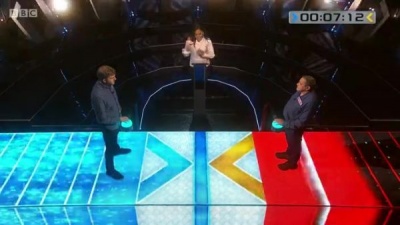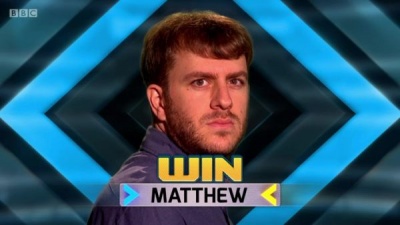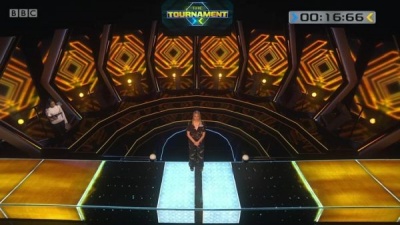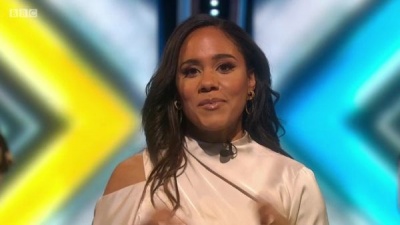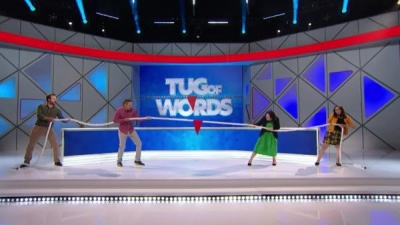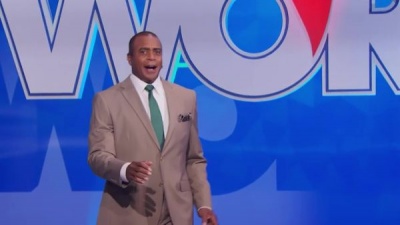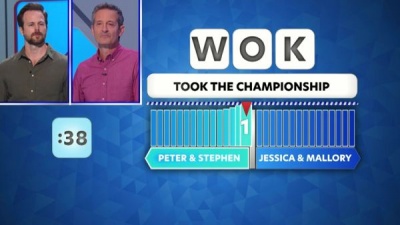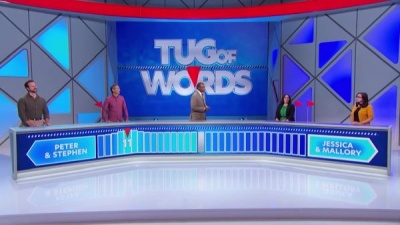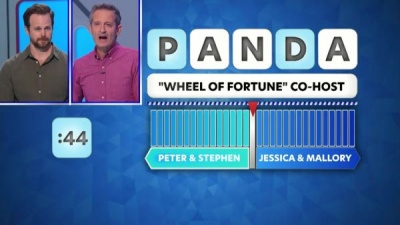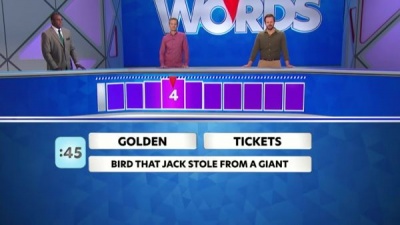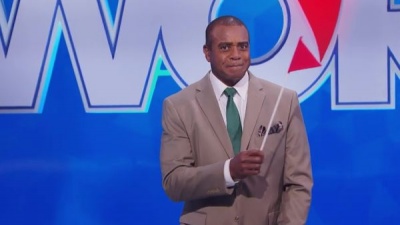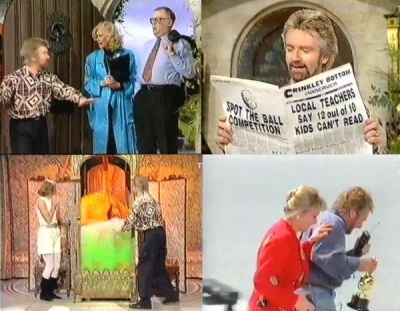Weaver's Week 2021-11-28
Last week | Weaver's Week Index | Next week
One of the most traditional field sports is the "tug o'war". Teams of people try to pull backwards, forcing the other team forward, until one of them has moved far enough to be the losers.
It's a traditional sport, and it can make for very dull television – when teams are evenly matched, the games can go on for minutes – hours, even. Shows like The Superteams and Star Games can get round this problem by editing the contest into something shorter. Raven asked its contestants to sit down and pull. Other shows follow the lead of Bamzooki and set a time limit, whoever's ahead at the final whistle wins.
Back in 2014, Global Agency exhibited "Tug of War" at the MIPCOM Festival of Fabulous Formats. The brief synopsis: "general knowledge in a rope-tugging game show where contestants pull one another down a 'money rail'." To the best of our knowledge, neither of the shows we look at are this format.
Contents |
The Tournament
QITV for BBC1, from 8 November
Alex Scott, host of Football Focus, takes the reins of this new quiz. Eight players have gathered at the studios in Glasgow, each is in their separate pod around the rim of the studio. Alex is in the middle. Any resemblance to other semi-circular quiz shows (Fifteen-to-One, The Weakest Link) is probably coincidence.
We meet the players, one-by-one. Each states their name, location, occupation, and gives a reason why they're bound to win. "A battle cry", claims Alex. C'mon, this is daytime BBC1, calm and genteel and not at all challenging. Daytime BBC1 doesn't go in for trash talk, but will permit litter loudmouthing.
Eight questions are asked of the players, multiple-choice with four possible options. We see who got each question right and wrong, and how quickly they respond. After all eight questions, the leaderboard emerges: most right answers at the top, ties broken by speed of response.
The top player on the leaderboard carries £500 into the next round. Next player has £350, then £300, £250, £200, £150, £100. The bottom-ranked player takes a mere £10 through.
Rankings on the leaderboard are essential. Whoever's top of the board gets first choice of their opponent, and first choice of seven categories selected for the show. They're quite traditional and broad categories – "Natural World" or "Science and Technology". After the players have assumed their starting position – all done with the maximum of fuss, pounding drums and flashing lights and a special caption – Alex tells us who an earlier assessment suggested would be the better at this topic.
And after all this fluff, the head-to-head finally takes place. Give eight more correct answers than your opponent and you've won the game. Otherwise, whoever's ahead after two minutes is the winner. Still tied? They'll ask another question until a winner is found. All questions are on the buzzers, all questions can and should be interrupted. Questions can be handed over on an error.
Whoever wins the head-to-head is shown again, as the winner. It's all done in the style of video games, perhaps not what we're expecting in mid-afternoon. The winner of each contest takes the money assigned to their opponent – so if you beat the £200 player, you add £200 to whatever you took into the round. If you complete the win inside two minutes – a "knockout" – there's a bonus £500 to be had. Alex always refers to it as a "cheeky" bonus.
So there are four of these head-to-head contests, reducing the contenders to four. Whoever's got the most cash gets to pick their opponent for the second round, and pick the subject from the three remaining. The format is – exactly the same as the first round, and this feels like a bit of a missed opportunity. They could have had a pair of solo rounds – one person plays for a minute, then the other person plays for a minute.
Anyway, the final round involves the last two players, it's always general knowledge. Players are looking to win the money they've taken into the round, the total isn't added together. The show's designed so that someone is absolutely certain to go away from every episode with a decent amount of money – a theoretical maximum of £5800, typically £1000-£1500 (€1150-1750). Sure, it's half the prize of The Weakest Link, but in the same ballpark as other shows in this slot – and to ITV's Lingo on the other side in a few minutes.
It is possible for someone to win the final by a knockout, eliminating their opponent in the two minutes. When this happens – and it's quite a rare achievement – they fill the time with a Golden Run. Three correct answers in 30 seconds to double the prize money.
The Tournament: champions?
For our money, The Tournament is a curate's egg. It's got a lot of very good ideas, but the whole is less than the sum of the parts.
The scaffolding around the show is top-notch. Stefano Civetta's soundtrack adds atmosphere, though there's not much of a tune. The visual design is coherent – blue and yellow chevrons are tasteful, and lend themselves to diamonds and octagons. The studio has a distinctive look. But there are awkward details: buzzers visibly light up before we hear the thud to denote someone's buzzed in. And we don't get to see the score clearly: it's only displayed on the floor, and we've got to think about whether this blue area is bigger than that yellow area.
There's lots of quiz, plenty for the quiz fan to get their teeth into. Alex asks about 9 questions per minute during the quiz segments, across the course of the show that's about 65% as fast as Channel 5's all-quiz all-the-time show 100%. It's surprisingly rare for a daytime show to go at that pace – a similar speed to The Chase or University Challenge before Paxman's recent slowdown. Even more weird when we realise that half the show's time is taken up by not quizzing, but by meta stuff.
They choose to allow contestants to return for a second show, but don't make much of this in the broadcast show. We've no problem with returning players, but it's odd that they've not made a format point out of this. Pointless and Fifteen-to-One make a habit out of chatting and discussing what went wrong yesterday.
The show's atmosphere isn't quite right. There are flashes of aggression, people might give a little disrespect to their opponents. The show wants people to be nasty and objectionable. But, by and large, the players are far too pleasant to indulge in such unpleasantness. The Tournament wants to be a primetime programme played for lifechanging stakes, but it's on daytime BBC1 and played for a good holiday.
Another thing that would have helped: a co-host. Alex Scott has a lot to do here: ask the questions, answer the questions, remember the rules, banter with the players. Specifically, she's to ask a lot of questions precisely and clearly and quickly. To do this, she adopts a slightly unnatural near-monotone, and often puts emphasis in unusual places. The words are accurate, but it sounds a bit odd. We've found it a little tiring, especially when Alex has two-minute question and answer monologues.
And we think back to other daytime shows, hosted by people whose experience wasn't as a broadcaster. Two people turn it into a conversation, adds a level of friendship for the viewer. Matt Alright on The Code, ably assisted by Lesley Brewis. Alexander Armstrong and Richard Osman on Pointless. Even the OG of daytime quizzes, Emlyn Hughes on Box Clever - that retired footballer chatted with the competitors, and tried to explain the board; Dr. Sue Kingsman asked and adjudicated the questions, so Emlyn didn't have to. Would The Tournament feel better television if Alex shared the hosting duties with someone? A bad cop to Alex's good cop?
Ultimately, we file The Tournament as deep background television: it's not a show we would turn off if we stumble on it, but nor is it one we'd actively seek out. It's not a show we expect to return to during this series. A few changes here and there would make it much more appealing.
Tug of Words
Embassy Row for Game Show Network, from 8 November
GSN's original shows share a number of qualities. They're brisk – just 18¾ minutes from start to finish. They offer a top prize of $10,000 (€8850, £7600). And they ask contestants to make a bit of a spectacle of themselves.
In this case, literally tugging on a rope, to demonstrate — oh, you're ahead of us.
Ahmad Rashad is the host, he's known to the audience as an NBA basketball commentator, and as the second host of ABC's The Mole. He's very personable, brings out a lot in people in the very short time available.
The game is a competitive twist on Chain Letters. Ahmad will read out a very crisp clue to the next word in the chain. Change one letter to make the link. For instance, "Took the championship" from "Wok", they want the answer "Won".
Now, on Chain Letters, there was all sorts of faff around how to announce the answer. "Change the K to an N to make WON, W-O-N." On Tug of Words, they don't bother with all this frippery, just say "Won". It makes for a lightning-fast game, they're able to ask a dozen links in the 40 seconds available.
The game's played by teams of two, and they answer in turn. No interrupting, Ahmad won't accept an answer until he's finished speaking. Each team plays their 40 second round in turn, and whichever team has the more correct answers wins the round. They're awarded a flag, a small red pennant on the top of a stick, which stays on the top of their desk.
After two rounds with three-letter words, the game gets more complex and dangerous: they advance to four-letter words. Graphics are clear on the screen, the word and the clue and the score are always on view. The score's also displayed on an LCD on the desk before the teams. The teams are keeping good physical distances, and it looks quite natural.
Each "flag" – each round won – represents a one-space headstart in the final round. This is where Tug of Words really gets interesting, as they go in for five-letter words. The players need to change two letters – they're told which two to change. Wouldn't catch Jeremy Beadle changing two letters at once.
Only the winners of this final round take a prize – $1000. They then play the bonus round, where whole words change in a two-word phrase. For instance, "Willy Wonka gave them out" from "Parking tickets". A net ten correct answers in a minute wins – by "net" we mean that a mistake cancels out a previous correct answer.
And, with the minimum of fuss, that's the show completed. There's absolutely no fluff, no filler. Everything is in service of the main game, and it's almost impossible to have the show on in the background without playing along. The set is blue and grey, which is an interesting look, almost futuristic design; the sound cues are the sort of beeps we'd expect from 90s computers.
Any danger of a version over here? Minimal-to-none, there's simply no space for 15-minute programmes on this island. There is on the continent, Lingo ran for many years at almost exactly this brevity.
Still, we get one of the year's defining images.
In other news
Noel's House Party celebrated its 30th birthday this week. For five years, it was unmissable Saturday night television, with a solid format: some hidden-camera stunts, pre-recorded embarrassment for a family, a celebrity getting their comeuppance, and the ever-present danger of the show being crashed by that horror in a colourful suit.
Such is the show's cultural impact that there are not one, but two, links to note. BBC Archive has the just-about official history of the show: a short piece of writing, and a one-hour package of highlights and memories (we think the latter is geoblocked to .uk viewers). An unofficial history from Jonathan Bufton and Robin Blamires – nhp30.com – will review all eight series, one by one.
Episode 2 of TV Show and Telly goes behind the scenes of The Wheel and Pointless with Tom Blakeson. Where did they get the idea for the Pointless Tower from? Next week: Bobby Seagull.
BBC3 is coming back to your television. The service for young people has been "online only" since early 2016, which has dented the audience for hit shows like RuPaul's Drag Race. It's set to return to an EPG near you in February next year.
A brief reminder, to anyone who might need to hear it: Channel 4 gets no money from taxpayers.
Quizzy Monday continued. Very high scoring on Mastermind, where 23 points served only for third place. Third! Most weeks it would win! Andrew Fanko's 26 was not a winning score, it was beaten by Patrick Buckingham and a stonking 27 points!!! That would have made a superlative series final.
Discothèques booked the last place in Only Connect (2) quarter finals, beating the Steelers by seven points. Neither team knew the destinations of A-roads, or how the Countdown numbers round works. Question of the night: demises of Cyclops – the Greek myth, the ship, the X man, and the beepy thing they had to check serves at Wimbledon.
And in University Challenge, Trinity Cambridge beat St Hilda's Oxford by 235-45. For much of the game we wondered if St Hilda's might beat James Newman for the most unjust zero points of the year; some slightly generous adjudication helped the modest total. We're not a fan of these blowout matches: they're over as a contest with ten minutes to play, and watching teams struggle just isn't good telly.
Some sharp intakes of breath on this week's matches. Mastermind described the completely re-recorded version of "Fearless (Taylor's version)" as a re-issue: might we describe a completely new edition as a repeat? Only Connect caused general consternation when one team criticised the musical Hamilton, which is the modern intellectual equivalent of breaking wind in a crowded restaurant.
Late November brings us a few new delights. Killer Camp is a bit of horror (ITV2, nightly from Monday), and there's a fresh run of I'm Sorry I Haven't a Clue (Radio 4, Monday).
Pictures: "Police Tug of War along Toronto Waterfront" by Bobcatnorth (CC BY-NC-SA 2.0), QITV, Embassy Row, Unique / BBC.
To have Weaver's Week emailed to you on publication day, receive our exclusive TV roundup of the game shows in the week ahead, and chat to other ukgameshows.com readers, sign up to our Google Group.

